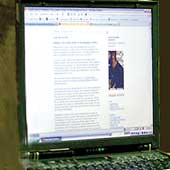 |
| Read it with a pinch of salt |
With shrinking book review pages in newspapers and magazines and cramped bookshops, how does one know what is going on in the world of books? Through literary journals would be one answer, but they are expensive. It would also require regular visits to the library, a habit that is not easy to inculcate.
The pat answer would be the internet with broad-band connectivity. It would take you to all the literary and publishers’ sites that post new and forthcoming titles well in advance. But these entries just tell you the name of the author, the title and price, but nothing more. And if there were a short description it would be an excerpt from the blurb, which, as we know, is pure hype.
Perhaps, checking out the literary blogs have come to be seen as an alternative to the absence of reviews in the print media. But there are three questions that readers must bear in mind.
First, are bloggers critics, which professional reviewers are supposed to be? The question has arisen because some entries in Google have been found to be downright wrong with their facts. The fact remains that most bloggers are fly-by-night characters who do reviews for the heck of it, often without reading the book carefully. But so is the case with most reviewers who gloss over their reviews. This is the subject of an on-going debate in the western media, with bloggers picking on reviewers and vice versa.
Second, the quality of reviews in blogs often reveals a casual approach as there are no restrictions on space and virtually no accountability. Third, checking out blog entries requires a personal computer with broad-band connections. It is not expensive but it still requires a small investment that may be beyond the reach of the real users — the middleclass.
Hence the big question: what is to be done? Given the current mania for dumbing down, of restricting a copy to a maximum of 500-600 words, and, above all, reducing the media to a subdivision of the entertainment industry, it is clear that book review pages are not going back to their earlier form. At best, we could get short takes, something like ‘Briefly Noted’, but nothing more than that.
What needs to be done is a mix: check out from the internet what is coming and back it up by looking up reviews in literary magazines. Because of highly specialized niche marketing, there is a tiny gap between web entries of new books and print reviews; the marketing departments of big houses tie up both outlets at the same time, making sure one follows the other without too much of a gap. But it is absolutely necessary that you trust your individual judgment; do not go by what bloggers or reviewers say. In matters of taste, your own hunch is the best guide because you know what you like best.










